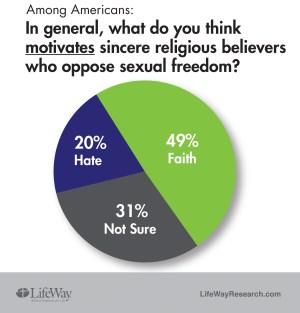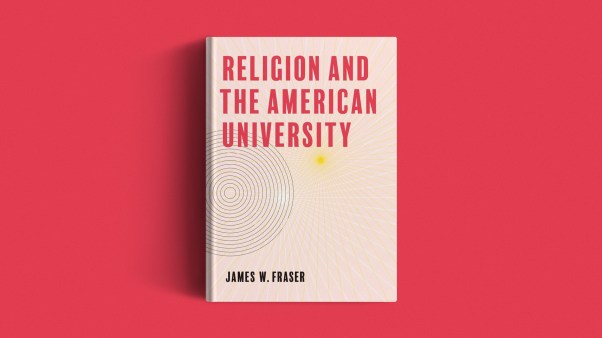Americans love to fight about sex and religion.
From shacking up and same-sex marriage to birth control and bathrooms, Americans disagree about what is right and wrong with sex—often based on faith.
Those disputes can end up in court, in highly divisive and controversial cases. This week, the US Supreme Court agreed to hear the case of a Colorado baker who refused to make a cake for a same-sex wedding.
When faith and sexuality clash, which side should prevail? Americans can’t decide.
About half of Americans (48%) say religious freedom is more important in such conflicts when faith and sexuality clash, according to a new study from Nashville-based LifeWay Research. A quarter (24%) say sexual freedom is more important. A quarter (28%) aren’t sure.
“It’s clear Americans value religious liberty,” said Scott McConnell, executive director of LifeWay Research. “But when it comes to sex, they aren’t sure religion should have the final word. That’s especially true for younger Americans and those who aren’t religious.”
Religious beliefs, age matter
LifeWay Research’s study is based on new analysis of a survey of 1,000 Americans. Researchers wanted to get a big-picture look at how Americans view conflicts between religious views and sexuality, McConnell said.

They found Americans’ views are divided by geography, religious beliefs and demographics.
Men (30%), those in the Northeast (33%), Hispanic Americans (31%), and those 18 to 44 (30%) are more likely to favor sexual freedom. So are nones, those with no religious affiliation, at 49 percent.
Southerners (53%), those with evangelical beliefs (90%), Protestants (68%), African Americans (58%) and those 55 and older (55%) are more likely to favor religious freedom.
Researchers also asked Americans to indicate if the freedom they selected is always more important or usually more important. One in 10 Americans say sexual freedom always matters most. Another 14 percent say sexual freedom usually matters most. Meanwhile, 31 percent say religious freedom always matters most, and 17 percent say religious freedom usually matters most. About a quarter are not sure.
Americans with evangelical beliefs are more likely to say religious freedom always matters most (74%). So are those who attend religious services at least once a month (56%).
Nones (22%) are more likely to say sexual freedom always matters most. So are those who attend services less than once a month (13%) and those from non-Christian faiths (15%).
Faith versus hate
One other major question for LifeWay Research: Do Americans think religious believers are motivated by hate or faith in disputes over sexuality?
About half say faith is the main motivation (49%). One in five say hate (20%). Almost a third aren’t sure (31%).

Researchers found a range of responses, based on demographics and beliefs, to the question, “What do you think motivates sincere religious believers who oppose sexual freedom?”
- Those with evangelical beliefs: faith (77%), hate (3%), not sure (20%)
- African Americans: faith (61%), hate (11%), not sure (32%)
- Christians: faith (58%), hate (13%), not sure (29%)
- Ages 45+: faith (54%), hate (15%), not sure (32%)
- Southerners: faith (53%), hate (18%), not sure (29%)
- Those without evangelical beliefs: faith (44%), hate (23%), not sure (33%)
- Ages 18–44: faith (44%), hate (25%), not sure (30%)
- Attend services less than once a month: faith (42%), hate (25%), not sure (33%)
- Nones: faith (29%), hate (34%), not sure (36%)
McConnell said most Americans don’t think disputes over sexuality and faith—such as cases of a Christian baker who won’t make a cake for a same-sex wedding—are driven by hate on the part of religious believers.
Many see that religious believers are motivated by their faith, he said. Others are skeptical.
“About one in five Americans—often those who aren’t religious—suspect these disputes are driven by hate,” McConnell said. “And a third aren’t sure. That’s concerning.”
Bob Smietana is senior writer for Facts & Trends magazine.
LifeWay Research conducted the study Sept. 27 – Oct. 1, 2016. The survey was conducted using the web-enabled KnowledgePanel®, a probability-based panel designed to be representative of the U.S. population. Initially, participants are chosen scientifically by a random selection of telephone numbers and residential addresses. Persons in selected households are then invited by telephone or by mail to participate in the web-enabled KnowledgePanel®. For those who agree to participate but do not already have internet access, GfK provides at no cost a laptop and ISP connection.
Sample stratification and weights were used for gender, age, race/ethnicity, region, metro/non-metro, education and income to reflect the most recent U.S. Census data. The completed sample is 1,000 surveys. The sample provides 95 percent confidence that the sampling error does not exceed plus or minus 3.1 percent. Margins of error are higher in sub-groups.
LifeWay Research is a Nashville-based, evangelical research firm that specializes in surveys about faith in culture and matters that affect churches.











